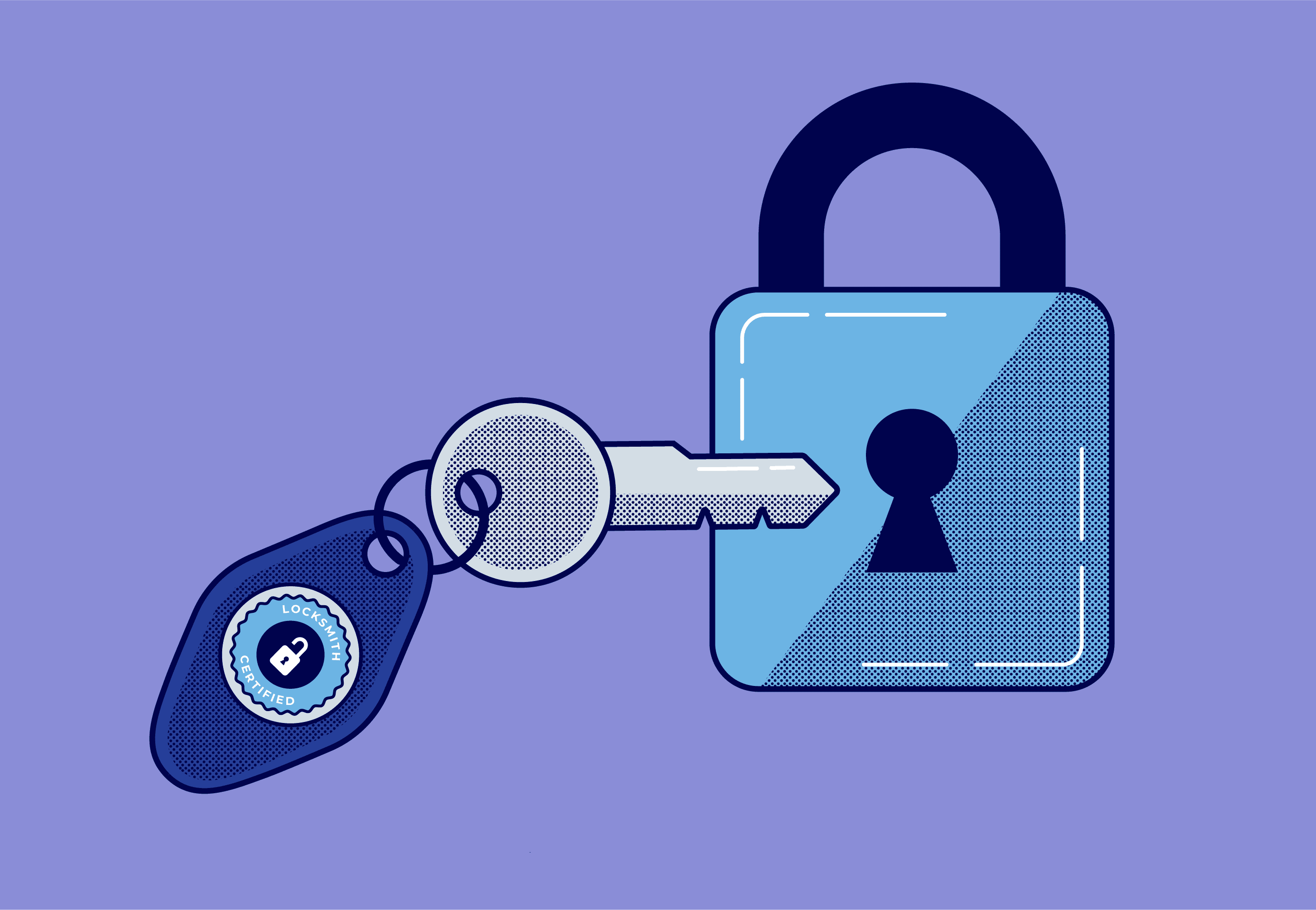Understanding Locksmith License Requirements by State
Navigate the complexities of locksmith licensing with our essential guide. Understand the requirements, regulations, and steps to get started.
Jul 11, 2025

Do you know your state’s locksmith license requirements?
Just like other skilled trades, locksmith licenses vary greatly from state to state. Some states require you to apply for a locksmith license, take an exam, and undergo a criminal background check, while others don’t require licensing at all, or delegate it to the city or county level.
To help you understand what’s required where you operate, we’ve compiled a full list of locksmith licenses by state, along with why becoming a licensed locksmith and obtaining a locksmith certification can help your locksmith business thrive.
Introduction to the Industry
The locksmith industry is an essential part of modern society, providing critical security solutions for homes, businesses, and institutions. Locksmiths are highly skilled professionals who specialize in installing, repairing, and maintaining a wide variety of locking devices and security systems. From helping customers regain access to locked properties to upgrading commercial security, locksmith services are in constant demand across residential, commercial, and automotive sectors.
As the need for advanced security grows, so does the importance of proper locksmith licensing and regulation. Licensing ensures that locksmiths meet established standards of professionalism and trustworthiness, and protects businesses and consumers from unqualified providers. In addition to licensing, ongoing training and certification help locksmiths stay current with the latest technologies and best practices, ensuring high-quality service delivery. Whether you’re considering starting a locksmith business or seeking locksmith services, understanding the industry’s requirements and the value of working with licensed professionals is crucial for safety and peace of mind.
Why Become a Licensed Locksmith?
When you’re performing locksmith work, you’re often entrusted with people’s homes, businesses, and valuables. States and municipalities regulate this trade to provide consumer protection, ensuring that those who offer locksmith services are trustworthy, skilled, and compliant.
Even if your state does not require locksmith licensing, obtaining a certified locksmith or professional certification shows customers you take your trade seriously. Certifications are excellent credentials that distinguish you from competitors.
Locksmith Training and Education
Becoming a successful locksmith requires a combination of formal education, hands-on training, and ongoing professional development. Most locksmiths begin their careers by completing a high school diploma or equivalent, followed by specialized training programs offered by trade schools, community colleges, or industry associations. These programs cover essential topics such as key cutting, lock installation, safe deposit boxes, electronic security systems, and the legal aspects of locksmithing.
Many states and localities encourage or require aspiring locksmiths to complete an apprenticeship under the supervision of a licensed or certified locksmith. This real-world experience is invaluable, allowing trainees to develop practical skills and learn the day-to-day responsibilities of the trade. In addition, locksmiths can pursue professional certifications, such as Certified Registered Locksmith (CRL), Certified Professional Locksmith (CPL), or Certified Master Locksmith (CML), to demonstrate their expertise and commitment to excellence.
Continuing education is also a key part of maintaining a successful locksmithing business. As security technology evolves, locksmiths must stay up to date with new products, tools, and regulations. Many professional organizations offer workshops, seminars, and online courses to help locksmiths expand their knowledge and maintain their credentials. Investing in comprehensive training and education not only enhances your skills but also builds trust with clients seeking reliable locksmith services.
How Do You Get a Locksmith License?
If you’re wondering how to get a locksmith license or how to get a locksmith license in your state, here are the common steps:
Meet basic eligibility
Most states require you to be at least 18, have a diploma, and submit recent passport-quality photographs. Application requirements may include specific qualifications, documentation, and fees, which vary by state.
Complete locksmith training
Some states recommend or require training and/or apprenticeship under a locksmith supervisor with an apprentice locksmith permit. You can also explore professional training and certification programs through organizations like the Associated Locksmiths of America (ALOA) to enhance your skills and credibility.
Pass a background check
A criminal history report (or criminal history background check) is often required as part of the process.
Submit required documents
Submitting a licensing application, along with proof of insurance, certificate workers compensation, and other required documents, is a key step.
Pay the required fee
First-time applicants pay an initial fee and later a renewal fee.
Pass a state exam
In some states, successful completion of a written or practical test is required.
Receive your registration certificate
After approval, you’ll get your locksmith ID card and registration certificate, authorizing you to operate legally.
Local Regulations and Requirements
While some states have clear, statewide locksmith licensing requirements, many areas leave regulation up to local governments. This means that locksmith businesses and individual locksmiths must pay close attention to city and county rules, which can vary significantly from one jurisdiction to another. For example, places like Miami Dade County in Florida and Nassau County in New York have their own licensing processes, background check requirements, and documentation standards for locksmiths operating within their borders.
Local regulations may include additional steps such as submitting a separate individual locksmith application, providing recent passport photographs, or obtaining a local registration. Some areas also require proof of insurance, a workers compensation certificate, or a contractor’s license if the company performs work beyond standard locksmith services, such as electrical work. Failing to comply with local licensing requirements can result in fines, business closure, or legal action.
To ensure compliance, always check with your city or county government before starting or expanding your own business. Staying informed about local laws and maintaining all necessary licenses and certifications will help you operate legally, protect your reputation, and provide peace of mind to your customers.
Locksmith License Requirements by State
Below is a list of the licensing authority (or lack thereof) for each state. This is subject to change. Always check your state or local government for the most up-to-date information.
- Alabama — License Required
- Alaska — No statewide license required; Local licensing may apply
- Arizona — No statewide license required; Local licensing may apply
- Arkansas — No state license required
- California — License Required
- Colorado — No state license required
- Connecticut — License Required
- Delaware — No state license required
- District of Columbia — No state license required
- Florida — No state license; Certain counties may require licensing
- Georgia — No statewide license
- Hawaii — No state license required
- Idaho — No state license required
- Illinois — License Required
- Indiana — No state license required
- Iowa — No state license required
- Kansas — No state license required
- Kentucky — No state license required
- Louisiana — License Required
- Maine — No state license required
- Maryland — License Required
- Massachusetts — No state license required
- Michigan — No state license required
- Minnesota — No state license; Certain counties may require licensing
- Mississippi — No state license required
- Missouri — No state license required
- Montana — No state license required
- Nebraska — No state license required; Certain counties may require licensing
- Nevada — License Required
- New Hampshire — No state license required
- New Jersey — License Required
- New Mexico — License Required
- New York — No state license required; Certain counties may require licensing
- North Carolina — License Required
- North Dakota — No state license required
- Ohio — No state license required
- Oklahoma — License Required
- Oregon — License Required
- Pennsylvania — No state license required
- Rhode Island — No state license required
- South Carolina — License Required
- South Dakota — No state license required
- Tennessee — License Required
- Texas — License Required
- Utah — No state license required
- Vermont — No state license required
- Virginia — License Required
- Washington — No state license required
- West Virginia — License Required
- Wisconsin — No state license required
Additional Considerations
Apprenticeship & Permits
In states that allow apprenticeships, you may start with an apprentice locksmith permit and work under a locksmith supervisor. Some local unions and the International Union of Locksmiths can help place you in training programs.
Business & Insurance
If you’re a business owner, you may also need a contractor’s license (if you also perform electrical work) and show proof of insurance. Having a workers compensation certificate is often required when the company does work that employs others.
Application Process Tips
When you’re ready to apply for a locksmith license, have these ready:
- All required documents and documentary proof of experience
- Online application (where available)
- Proof of criminal history background check and photos
- Your license application, fee, and a certificate recommending you (if applicable)
Certification Beyond Licensing
Even in states without licensing, certified locksmith credentials (like CRL, CPL, CML) help grow your business and demonstrate your expertise. These certifications typically require continuing education, successful completion of an exam, and may benefit you on a day-to-day basis while actively engaged in locksmith work.
Drawbacks of Not Being Licensed or Certified
Operating without a license or locksmith certification can result in fines, lawsuits, and loss of customer trust. General contractors hiring unlicensed subs can lose their license and homeowners might be penalized for hiring unlicensed individual locksmiths if permits or inspections are required.
How Much Does it Cost?
The required fee, renewal fee, training, locksmith certification, and exam costs vary, often from a few hundred to a few thousand dollars depending on the state and organization. Budget for the application process, materials, tests, and ongoing education.
Some training programs can be completed in as little as two weeks, which can significantly affect both the overall cost and the time required to become licensed.
Secure Your Future in the Locksmith Industry
Understanding locksmith licensing, training, and regulations is essential for building a reputable locksmith company or hiring reliable locksmith services. Staying informed, investing in education, and complying with local and state laws help you establish trust and credibility in the industry.
Whether you’re just starting out or growing your company, focusing on proper licensing and locksmith certification strengthens your reputation, keeps clients safe, and supports the long-term success of your business. Additionally, ensuring that your team uses a locksmith business software to track technician licenses and keep customer information safe can build trust between locksmiths and their customers.
When you’re ready to streamline your operations and grow your locksmith business, book a demo with FieldPulse to learn how our software can help you succeed.


